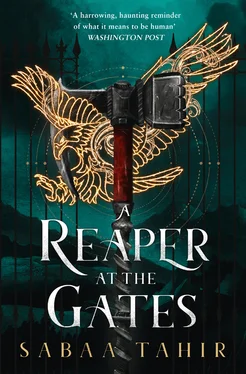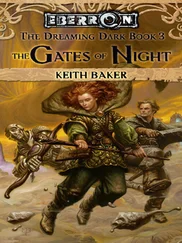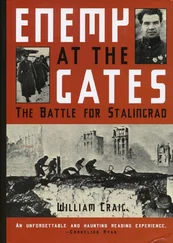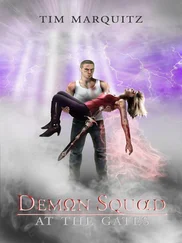Master. Master.
Beyond them, the Wraith Lord awaits my orders, along with the efrit kings and queens—of wind and sea, sand and cave, air and snow.
As they watch, silent and wary, I consider the parchment in my hands. It is as unobtrusive as sand. The words within are not.
At my summons, the Wraith Lord approaches. He submits reluctantly, cowed by my magic, straining always to be free of me. But I have need of him yet. The wraiths are disparate scraps of lost souls, joined by ancient sorcery and undetectable when they wish to be. Even by the Empire’s famed Masks.
As I offer him the parchment, I hear her. My queen’s voice is a whisper, gentle as a candle on a chill night. Once you do this, you can never come back. All hope for you is lost, Meherya . Consider.
I do as she asks. I consider.
Then I remember she is dead and gone and has been for a millennium. Her presence is a delusion. Her voice is my weakness. I proffer the scroll to the Wraith Lord.
“See that it finds Blood Shrike Helene Aquilla,” I tell him. “And no other.” He bows, and the efrits sail forward. I order the efrits of air away; I have a separate task for them. The rest kneel.
“Long ago, you gave the Scholars knowledge that led to the destruction of my people and the fey world.” A jolt of memory ripples through their ranks. “I offer you redemption. Go to our new allies in the south. Help them understand what they can call forth from the dark places. The Grain Moon will rise six months hence. See it done well before then. And you”—the ghuls press close—“glut yourselves. Do not fail me.”
When they have all left me, I contemplate the Star and think of the treacherous jinn girl who helped bring it into being. Perhaps to a human, the weapon would shine with promise.
I feel only hatred.
A face drifts to the forefront of my mind. Laia of Serra. I recall the heat of her skin beneath my hands, how her wrists crossed behind my neck. The way she closed her eyes and the golden hollow of her throat. She felt like the threshold of my old home when the rushes were fresh-changed. She felt safe.
You loved her , my queen says. And then you hurt her.
My betrayal of the Scholar girl should not linger. I deceived hundreds before her.
Yet unease grips me. Something inexplicable occurred after Laia of Serra gifted me her armlet—after she realized that the boy she called Keenan was naught but a fabrication. Like all humans, she glimpsed in my eyes the darkest moments of her life. But when I looked into her soul, something— someone —peered back: my queen, gazing at me across the centuries.
I saw her horror. Her sadness at what I had become. I saw her pain at what our children and our people suffered at the hands of the Scholars.
I think of my queen with every betrayal. Going back a thousand years, to each human found, manipulated, and loved until they freely gave me their piece of the Star with love in their hearts. Again and again and again.
But never had I seen her in the gaze of another. Never had I felt the sharp blade of her disappointment so keenly.
Once more. Only once more.
My queen speaks. Do not do this. Please.
I crush her voice. I crush her memory. I think I will not hear her again.
Everything about this raid feels wrong. Darin and I both know it, even if neither of us is willing to say it.
Though my brother does not speak much these days.
The ghost wagons we track finally roll to a stop outside a Martial village. I rise from the snow-heavy bushes where we’ve taken cover and nod to Darin. He grabs my hand and squeezes. Be safe.
I reach for my invisibility, a power awoken within me recently, and one that I’m still settling into. My breath wreathes up in white clouds, like a snake undulating to some unknowable song. Elsewhere in the Empire, spring has scattered its blossoms. But this close to Antium, the capital, winter still whips its chill fingers across our faces.
Midnight passes, and the few lamps that burn in the village sputter in the rising wind. When I am through the perimeter of the prisoner caravan, I pitch my voice low and hoot like a snowy owl, common enough in this part of the Empire.
As I prowl toward the ghost wagons, my skin prickles. I whirl, my instinct rearing in warning. The nearby ridgeline is empty, and the Martial auxiliary soldiers on guard do not so much as twitch. Nothing appears amiss.
You’re just jumpy, Laia. Like always. From our camp on the outskirts of the Waiting Place, twenty miles from here, Darin and I have planned and carried out six raids on Empire prisoner caravans. My brother has not forged a single scrap of Serric steel. I have not responded to the letters from Araj, the Scholar leader who escaped Kauf Prison with us. But together with Afya Ara-Nur and her men, we have helped to free more than four hundred Scholars and Tribesmen over the past two months.
Still, that does not guarantee success with this caravan. For this caravan is different.
Beyond the perimeter, familiar black-clad figures move in on the camp from the trees. Afya and her men, responding to my signal, preparing to attack. Their presence gives me heart. The Tribeswoman who helped me free Darin from Kauf is the only reason we know of these ghost wagons—and the prisoner they transport.
The lock picks are blades of ice in my hand. Six wagons sit in a half circle, with two supply carts sheltered between them. Most of the soldiers busy themselves with the horses and campfires. Snow gusts down in flurries, stinging my face as I get to the first wagon and begin working the lock. The pins within are enigmas to my freezing, clumsy hands. Faster, Laia.
The wagon is silent, as if empty. But I know better. Soon, the whimper of a child breaks the quiet. It is quickly shushed. The prisoners have learned that silence is the only way to avoid suffering.
“Where the burning hells is everybody?” a voice bellows near my ear. I nearly drop my picks. A legionnaire strides past, and a tendril of panic unfurls down my spine. I do not dare to breathe. What if he sees me? What if my invisibility falters? It has happened before, when I am under attack, or in a large crowd.
“Wake up the innkeeper.” The legionnaire turns to the aux hastening toward him. “Tell him to roll out a keg and prepare rooms.”
“Inn’s empty, sir. Village looks abandoned.”
Martials do not abandon villages, even in the dead of winter. Not unless a plague has come through. But Afya would have heard if that were the case.
Their reasons for leaving are not your concern, Laia. Get the locks open.
The aux and the legionnaire stalk off toward the inn. The moment they are out of sight, I get my picks in the lock. But the metal groans, stiff with rime.
Come on! Without Elias Veturius to get through half the locks, I have to work twice as fast. I have no time to think of my friend, and yet I cannot quell my worry. His presence during the raids has kept us from being caught. He said he would be here.
What in the skies could have happened to Elias? He’s never let me down. Not when it comes to the raids, anyway. Did Shaeva learn that he snuck Darin and me back across the Waiting Place from the cottage in the Free Lands? Is she punishing him?
I know little of the Soul Catcher—she is shy, and I assumed she did not like me. Some days, when Elias emerges from the Waiting Place to visit me and Darin, I feel the jinn woman watching us and I sense no rancor. Only sadness. But skies know, I’m no judge of hidden malice.
If it were any other caravan—any other prisoner we were attempting to break out—I would not have risked Darin, or the Tribespeople, or myself.
Читать дальше












